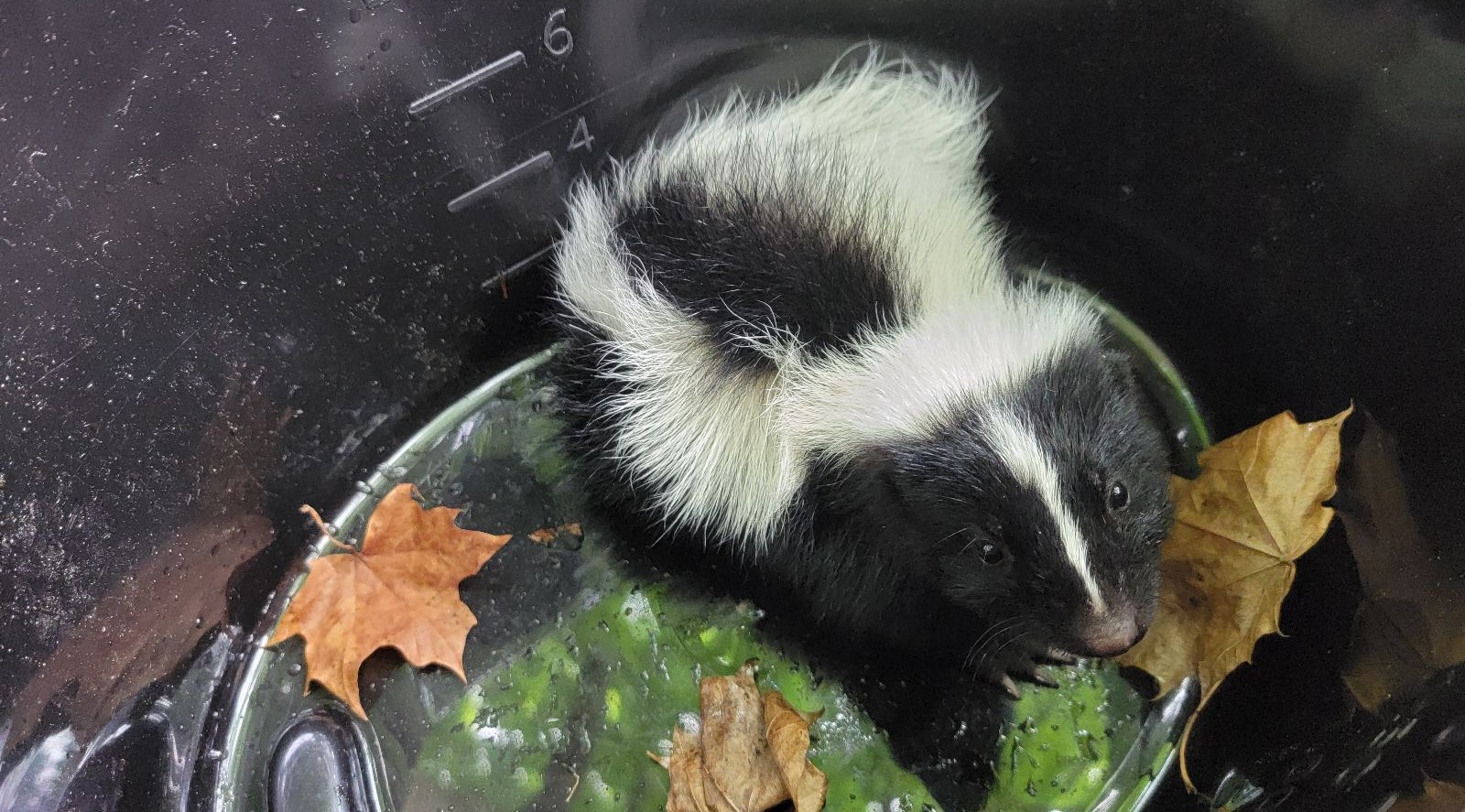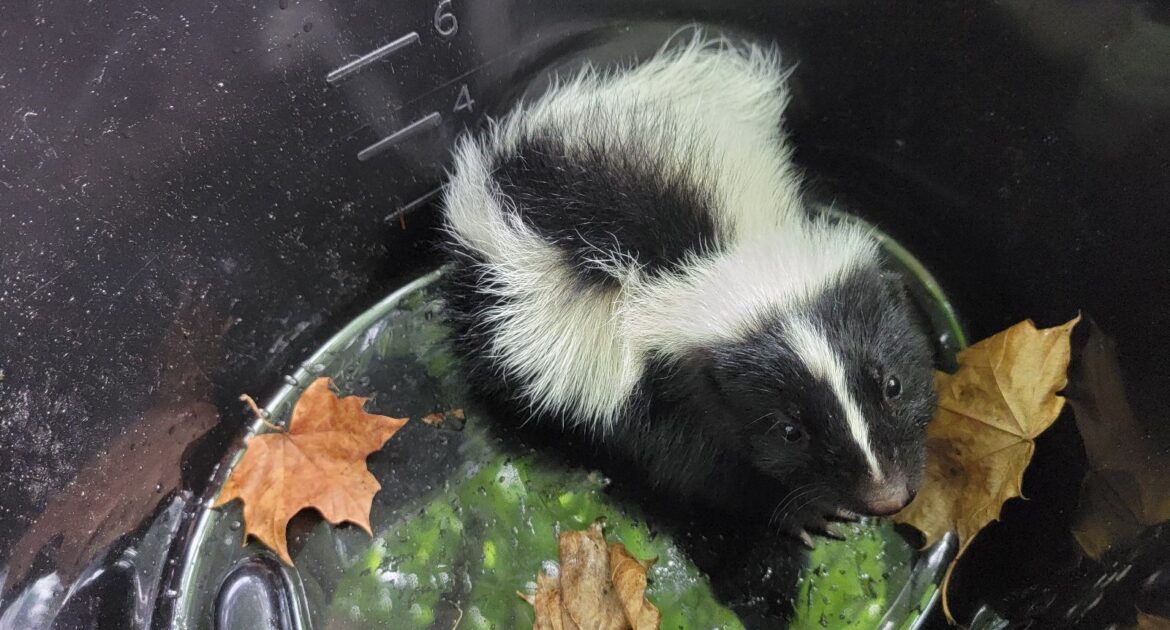When it comes to wildlife encounters, few experiences are as memorable—and unpleasant—as the smell of skunk spray. This potent defence mechanism has sparked countless skunk spray myths and misconceptions over the years.
At Skedaddle, we often hear misguided advice about neutralizing the odour or misunderstanding the nature of skunks themselves. Today, we’ll address common myths, share some facts about skunk odour, and provide reliable knowledge to help homeowners in places like Waterloo better understand and respond to skunk spray issues.
Fact or Fiction? Unpacking Skunk Spray Misconceptions
Despite how infamous skunk spray is, there are several misconceptions about it that cause confusion and mistakes. Here are some of the most common skunk spray myths we’ve encountered—from what the spray is to how you should deal with its effects.
Myth 1: Skunks Fully Empty Their Spray Glands with Each Spray
A popular belief is that every time a skunk sprays, it completely depletes its supply of spray. This, however, is not true. Skunks have two anal scent glands that contain a sulfur-based chemical called thiols, which is responsible for the foul odour. While each spray uses a portion of their glandular reserves, a skunk does not fully empty all of the fluid at once. Skunks are strategic in their sprays, often conserving some for future threats. However, it does take several days for them to fully replenish their reserves, which can leave them momentarily vulnerable to predators during that time.
What This Means for Homeowners:
If a skunk has sprayed near your home and moves on, there’s no guarantee that it’s defenceless. Always exercise caution around skunks and avoid behaviours that might provoke them further.
Myth 2: Tomato Juice Works Wonders for Removing Skunk Odour
One of the most persistent skunk spray myths is the idea that tomato juice is the ultimate remedy for neutralizing skunk odour. Many believe that bathing in tomato juice can eliminate the smell, but in reality, this is more myth than fact. While the strong scent of tomato juice might temporarily mask the odour, it doesn’t neutralize the chemical compounds responsible for the smell.
The Real Solution:
To effectively tackle the smell, you’ll need a solution that breaks down the chemical composition of thiols. A mixture of hydrogen peroxide, baking soda, and liquid dish soap is far more effective. This solution chemically reacts with the thiols, neutralizing the odour instead of just masking it.
Myth 3: Skunks Only Spray When They Feel Cornered
There’s a misconception that skunks only spray as a last resort and that they must feel trapped or cornered to release their odour. While it’s true that skunks prefer to use their spray as a defence mechanism rather than an attack, they don’t necessarily need to feel cornered to spray. Any perceived threat—whether from a curious pet, a human trying to shoo them away, or even a sudden movement—can trigger a spray.
Know the Warning Signs:
Skunks typically give warning signals before spraying. They may stomp their feet, hiss, or raise their tail. Paying attention to these warning signs can help you extricate yourself (or your pets) from the situation without any smelly consequences.
Facts About Skunk Odour and Its Impact
Skunk spray is undoubtedly unpleasant, but understanding a few key facts about skunk odour can help you manage the problem more effectively.
- Skunk Spray Is Long-Lasting: Skunk odour doesn’t dissipate quickly. When the spray gets on surfaces, pets, or even clothing, the smell can linger for weeks if not properly addressed.
- It Can Permeate Indoor Spaces: If a skunk sprays near your home, the odour can seep through windows, vents, or cracks, affecting your indoor air quality. This is especially problematic during warmer months when windows are often open.
- The Odour Can Affect Your Landscaping: Plants, soil, and gardens exposed to skunk spray may absorb the odour, making cleanup more challenging.
- It Can Be Difficult to Remove from Pets: When pets, particularly dogs, come into contact with skunk spray, the strong smell can cling to their fur. Traditional shampoos may not be effective, requiring specialized products or home remedies such as mixtures containing baking soda, hydrogen peroxide, and dish soap to neutralize the odour.
Understanding these facts can highlight the importance of quick and effective action if you notice skunk spray on your property.
Waterloo’s Concerns Around Skunks and Their Spray
Many homeowners in areas like Waterloo share similar concerns when it comes to dealing with skunks. Common complaints include the smell infiltrating homes, pets coming into contact with skunks, and repeated encounters with skunks in backyards or near porches. It’s important to know how to handle these situations to mitigate problems before they escalate.
If you’ve caught a whiff of that unmistakable smell, here’s what to do:
- Inspect Your Property: Look for signs of skunk activity such as burrows under decks, porches, or sheds.
- Secure Food Sources: Skunks are often drawn to garbage cans, pet food, or compost piles. Keep these tightly sealed and secure.
- Call for Professional Help: If you suspect skunks have taken up residence on your property, it’s best to enlist the help of trained professionals who can handle the situation safely.
How to Respond to Skunk Spray Safely and Effectively
React quickly but carefully to minimize the impact of skunk spray in or around your household. Here are some practical steps you can take:
- Ventilate Your Home
If skunk spray seeps into your home, open windows and turn on fans to disperse the odour. Be mindful of airflow paths that might intensify the smell in certain rooms.
- Clean Impacted Areas Immediately
If items like clothing, furniture, or outdoor surfaces are affected, use a proper cleaning solution. For fabrics, baking soda and detergent can help, while hard surfaces may require stronger sprays designed for odour elimination.
- Address Pet Incidents
Follow a tried-and-true pet de-skunking method involving a mix of hydrogen peroxide, baking soda, and dish soap. Avoid commercial shampoos that promise results without confirming their effectiveness.
Why Trust Skedaddle for Help With Skunks?
Skedaddle brings over 30 years of experience handling wildlife-related scenarios, including challenging skunk spray incidents. We take pride in providing humane and efficient services tailored to your needs.
If your property has fallen victim to skunks and their notorious odour, our team is here with effective strategies, skilled technicians, and the right tools to ensure peace of mind. Trust us to keep your property safe and spray-free in the future.
Take Action Before Skunks Take Over
Skunk spray myths often lead to misconceptions about odour management, but understanding the facts enables homeowners to address these situations responsibly. Whether you’re facing a skunk close to your property or need to contend with the lingering smell of spray, these tips will empower you to act confidently.
Dealing with skunks and their odour requires expertise and a measured approach. If you’re concerned about skunks on your property or need help managing their activity, contact Skedaddle today to schedule a consultation. Together, we’ll keep your home comfortable, safe, and free from unwanted smells.




